Broken Public Schools and Community Dialogue at Collaboraction
Public schools are funded by property taxes; in a racially and economically segregated city like Chicago, this system reinforces and exacerbates inequality. For the last two years, passions have been running particularly high around problems in the Chicago Public School (CPS) system. In the fall of 2012, Chicago saw a seven day long teacher’s strike, followed by a wave of school closings in the spring of 2013 concentrated in poor neighborhoods on the south and west sides of the city. Collaboraction highlights these substantial hot-button local issues in Forgotten Future: The Education Project, conceived and written by Sarah Moeller, co-written by Adam Seidel and Michele Stine, and co-directed by Sarah Moeller and John Wilson, using theater as a platform for community discussion of the dysfunction plaguing CPS. This production initially ran September 18-October 26, 2014 and will be re-mounted February 12-March 8, 2015.
Moeller is, herself, a teacher, and her motivation to create Forgotten Future was to educate audiences about the issues plaguing CPS. She observes that many people who do not have school-age children have no idea how schools are funded or what the recent conflicts are actually about. In addition, debates in the media highlight the voices of politicians, and Moeller and her team “wanted to focus on the voice of the students, rather than the adults in the room.” They engaged in an extended process of interviewing teachers and students, sifting through stories, identifying the gaps, and heading back into the field to conduct more interviews to fill in conspicuous silences. The current draft of Forgotten Futures underwent multiple major revisions through its development as new stories and perspectives were added, edited, and removed for both breadth and clarity.
Forgotten Future’s staging is immersive; audience members sit at tables and desks in an interactive classroom. Blackboards are covered with homework assignments and test reminders, posters with test-taking tips and motivation quotes like, “For success, attitude is as important as ability.” The Sunday matinee I attended had an intergenerational audience—about half the desks were filled with middle school students; in the post-performance “Town Hall Discussion” it became clear that many of the adults in the audience were their parents.
During the pre-show, projections scroll through statistics articulating the total annual educational spending by country and international test scores, placing the U.S. in a global educational context—turns out we spend more money and get poorer results than other nations. An audio track from a PBS News Hour segment on the school closures plays on a loop, including interviews with Mayor Rahm Emanuel and Karen Lewis, President of the Chicago Teacher’s Union. Lewis’ argument “the status quo is rich people get richer, beautiful schools, and poor people get bad schools; we are against the status quo” echoes through the space.
The performance begins when the audience is plunged into a rally protesting the closing of the schools. Actors wear red, several are clad in the real-life protest t-shirts worn during the school closure protests and the teacher’s strike. The audience soon claps and chants along: “There’s no power like the power of the people and the power of the people don’t stop (clap, clap).” Parents and teachers give speeches in between the chants. The kids in the ensemble try to speak, but the adults run right over them. By the end of the rally, the kids are standing off in a corner of the space, forlorn and ignored, while the adults yell on their behalf without ever asking their perspective.
The play as a whole tells the intertwining stories of three families—a Latino family on the west side, a Black family on the south side, and a White family on the north side. Forgotten Futures examines each family’s distinct problems and highlights the sharp inequalities within the CPS system.
African American fifth grader Isaac Tate’s (Tyrese Hall) elementary school has been closed. We watch his mother (Ebony Joy) review the new route he needs to take on his thirty-minute walk—a complex, specific route that crosses gang territory—to get safely to school. Once safely there, Isaac suffers from bullying, though his veteran teacher (Susie Griffith) tries her best (in her now-overstuffed class of forty students) to connect with him.
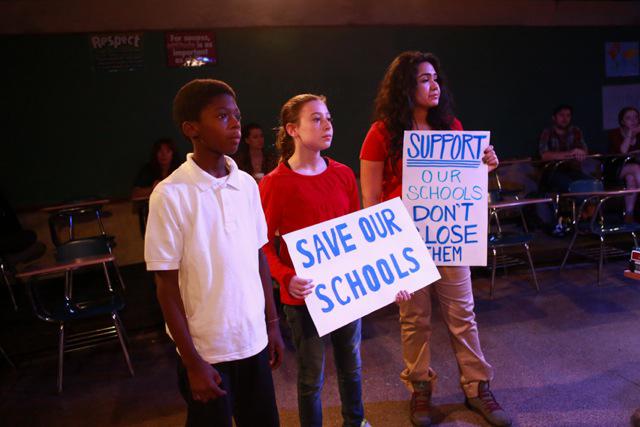
White eighth grader Lauren Perry (Leah Aberman) is under tremendous pressure from her father (Nathaniel Swift) to score perfectly on every assignment and every standardized test to win a coveted slot in the most elite selective enrollment high school. “Your test scores need to be perfect, your future is determined by what high school you go to; you have to go to Northside Prep.” She struggles with depression and perfectionism as her teacher (understudy Paula Ramirez, the role is usually played by Angelica Roque), battles against the incessant demands of standardized testing that act as an obstacle to actual teaching and learning.
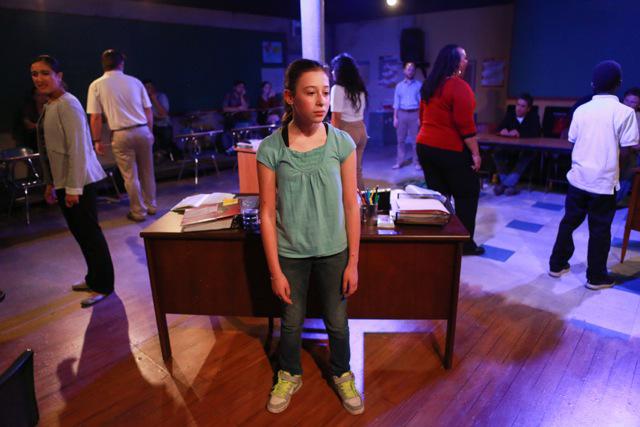
Latina eleventh grader Carolina Rodriguez (Esme Ayvar-Perez) got horrible scores on the pre-ACT ASPIRE standardized tests, and since these “tests determine the ACT and the future,” she’s given up hope and is determined to drop out of school. Her well intentioned mother (Jasmin Cardenas) is supportive and hopeful for her daughter’s future, but doesn’t entirely know how to help, and her first year history teacher (Scott Merchant) is stymied by the school’s lack of simple resources—the school doesn’t have pencils and paper and unbroken windows to keep in the heat during the brutal Chicago winter, forget computers to prep kids to take the digitally administered ACT.
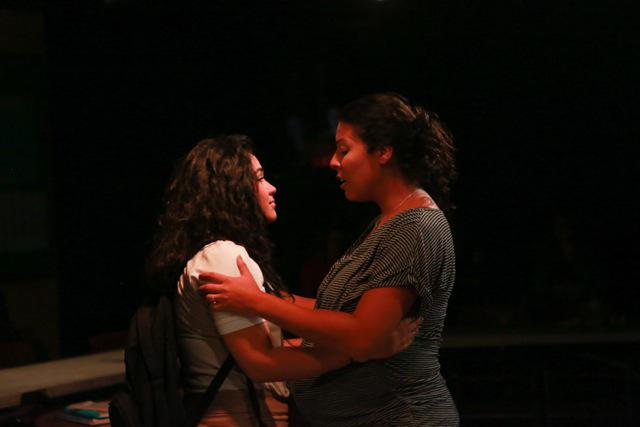
A town hall discussion follows the performance, co-facilitated by Moeller and a community partner from the Chicago Grassroots Curriculum Task Force. The intergenerational, mostly white audience is primarily interested in discussing the storyline focusing on selective enrollment schools. It becomes clear in the discussion that many audience members live this story, and are eager to share their personal experiences as students and parents. The facilitator asks them to step back and look at the larger narratives embedded in the play, asking “What does it mean that we live in a society where education is viewed as a privilege rather than a right?”
Many people who do not have school-age children have no idea how schools are funded or what the recent conflicts are actually about
Moeller closes the talkback stating that an explicit goal for the play to “educate people and get the word out” with a direct call to action “whether you have kids or not.” This call asks citizens to volunteer, and to vote in the midterm elections because state and local officials are the people who hold the most power in determining what changes, and what remains the same.
Forgotten Futures has an explicit and unapologetic political agenda to intervene in a local political problem. It argues for audience members to use our power as the electorate to change local political leadership in order to change this broken system.

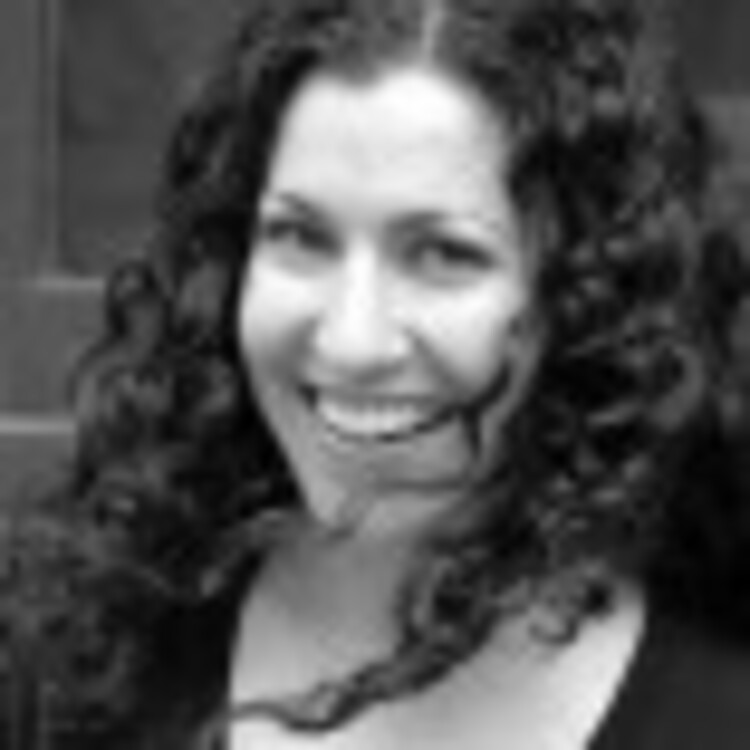
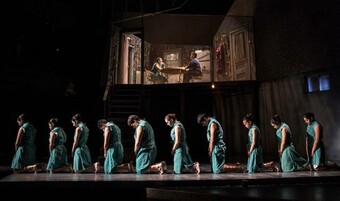

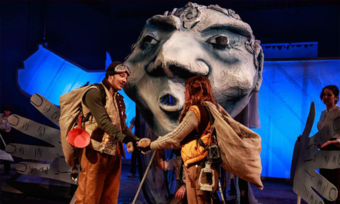
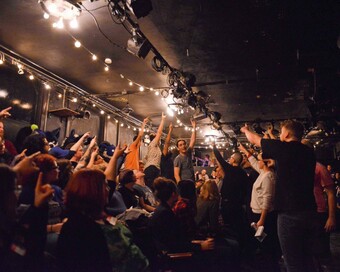

Comments
The article is just the start of the conversation—we want to know what you think about this subject, too! HowlRound is a space for knowledge-sharing, and we welcome spirited, thoughtful, and on-topic dialogue. Find our full comments policy here
Very interesting article, very important topic--well-documented. I am a Chicago educator, and it seems no one in the whole city disagrees the schools need improvement...yet they don't get improved. My main questions is "What can I do?" Yes, urging politicians to change the system can be helpful, but what can people do when it isn't election time? Moreover, every politician says they will improve education--but who is actually doing it? It is good this play is speaking to how terrible the issue is...but honestly, I think most people know. We just don't know what to do about it--from parents to community members to children to teachers ourselves--we are sad, mad, complaining and feel kind of helpless. What can we actually do? That's information the city needs more than anything else.